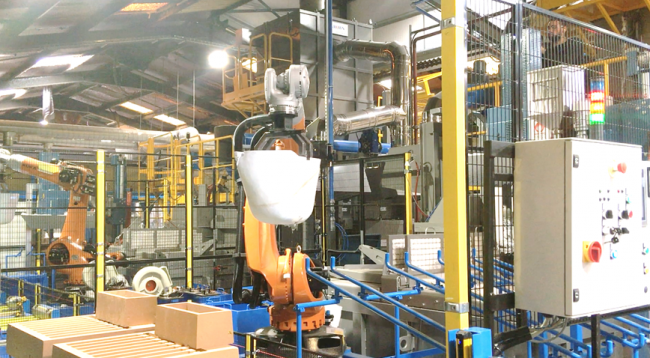3 minute read
Investment continues at Grainger & Worrall
As part of a £6m investment plan for expansion of its Bridgnorth facility, automotive casting specialist Grainger & Worrall has installed two new, partially automated melting towers at a cost of £1.5m.
The latest investment provides a significant increase in efficiency, and reduction in process time and energy consumption. Further enhancing the company’s capability and capacity, the melters can now process 2 tonnes of dual alloy ingot types per hour simultaneously, up from 800kg. As well as offering distinct health and safety benefits for operators, the semi-automated process is fully traceable, providing precise control of timings and temperature to help optimise the melting process.

The £1.5m equipment investment is the latest in a wider £6m investment programme being made by Grainger & Worrall / Picture: Grainger & Worrall




Andrew Hough, facilities director with Grainger & Worrall, said: “Installation of the two melting towers, which was a huge undertaking that required the facility’s roof to be raised by 2m, negates the downsides traditionally associated with batch processes: the peaks and troughs of process flow and the requirement to sustain furnace heat even when not in use, leading to production inefficiencies and a high level of waste energy.
“Melting tower design enables the pre-heating of the next batch of alloy ingots using the waste heat from the furnace below. Ingots can be pre-heated to 400oC, providing a vital process head start before melting occurs at 750 oC at furnace level. Two different types of alloy ingots can be utilised, which is a key benefit for the current automotive industry, where different alloys are frequently used depending on final application: engine block or head, for example. The running of two melters enables us to offer increased production flexibility, which provides a further time advantage for our vehicle manufacturer customers.”
Alongside identification of an opportunity to refine a proven process, an increased demand for Grainger & Worrall’s casting expertise has been one of the main inspirations behind the latest expansion. The company is able to carry out prototyping using the ‘Make Like Production’ concept, which then makes the transition to series production more straightforward and cost-efficient, and less time-consuming. Make Like Production is a technique for producing early-stage development parts that behave as a production component would – enabling extensive vehicle testing and validation even if final production materials and processes differ. This can bring vital cost and time savings to vehicle manufacturers seeking to bring entirely new models to market.
The semi-automated melting process gives Grainger & Worrall enhanced control over key stages. For example, the process of flowing the alloy into the ladle before being poured into a mould is now carried out automatically, as opposed to by hand. Precise temperature readings can be analysed to determine optimal timings throughout the process, helping to deliver a consistent, more repeatable cast in a reduced timeframe while also removing the risk of manual operators working in the hot zone.
Grainger & Worrall director, Matthew Grainger, added: “We are sympathetic to vehicle manufacturers working within an increasingly disrupted industry, where technology is expected to work more efficiently, be developed in a narrower timeframe and, of course, cost less.
“Our continued investment in expanding Grainger & Worrall facilities is designed to address this concern, enabling a contraction in the time to market of new products. For example, the trend of engine downsizing is putting pressure on the physical metallurgy of components: smaller internal combustion engines are expected to work harder under increased pressure. We are proud to make this latest investment knowing that processes can not only be made more efficient, but that manufacturing benefits, such as precise control of casting and a higher quality component, can be passed on to the automotive industry.”